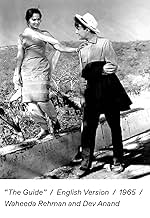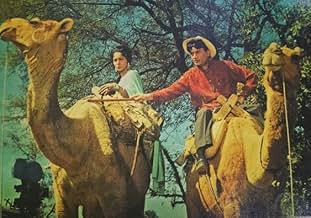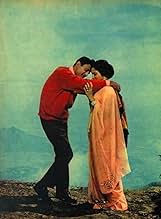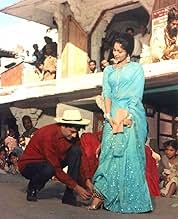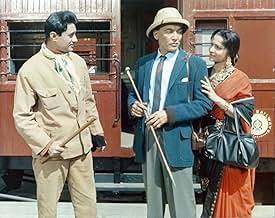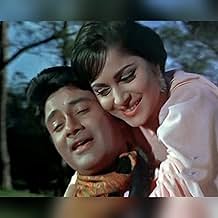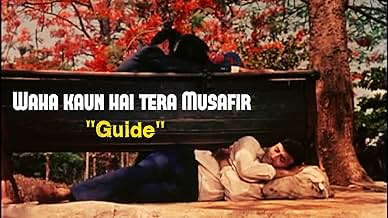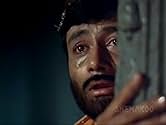IMDb RATING
8.3/10
8.9K
YOUR RATING
When mistaken to be a sage by some villagers, an ex-tour guide reflects on his past and lost love to search for spiritual wisdom to guide the villagers.When mistaken to be a sage by some villagers, an ex-tour guide reflects on his past and lost love to search for spiritual wisdom to guide the villagers.When mistaken to be a sage by some villagers, an ex-tour guide reflects on his past and lost love to search for spiritual wisdom to guide the villagers.
- Awards
- 9 wins & 3 nominations total
Gajanan Jagirdar
- Bhola
- (as Jagirdar)
Praveen Paul
- Bhola's Wife
- (as Pravin Paul)
Mridula Rani
- Laxmibai
- (as Mirdula Rani)
Featured reviews
When I travelled from India to US this was the only Hindi movie DVD that I carried with me. To me this is a "complete movie", as a movie should be. It entertains me by taking me through a wide gamut of emotions, it stimulates me spiritually and philosophically (indian faith, western existentialism are all there) and it is technically brilliant.
Each scene seems to be individually composed and you can see the effort that director vijay anand and his crew put in. Raju speaks to us in one of the scenes "there is not much difference between me and you". And as he speaks this you see the statue of Krishna in the background and Raju's index finger stretched as if holding a sudarshan chakra. Brilliant!!! Subtle things like these that you have to watch out for. The name "Guide" itself conveys a different meaning at different times in the movie; a railway guide, a personal guide and then a spiritual guide.
It is very sad that a brilliant director like Vijay Anand could never come out of the shadows of Navketan and despite giving us some of the most important and influential movies of our times was ignored. People in west respect their classics and make an effort that Billy Wilder, Hitchcock, Orson Welles, Chaplin etc. are not forgotten. New directors openly admit how much they have been influenced by these people. But in India, what is not on MTV is not worth remembering. In another 10 years no one will remember Vijay Anand.
Each scene seems to be individually composed and you can see the effort that director vijay anand and his crew put in. Raju speaks to us in one of the scenes "there is not much difference between me and you". And as he speaks this you see the statue of Krishna in the background and Raju's index finger stretched as if holding a sudarshan chakra. Brilliant!!! Subtle things like these that you have to watch out for. The name "Guide" itself conveys a different meaning at different times in the movie; a railway guide, a personal guide and then a spiritual guide.
It is very sad that a brilliant director like Vijay Anand could never come out of the shadows of Navketan and despite giving us some of the most important and influential movies of our times was ignored. People in west respect their classics and make an effort that Billy Wilder, Hitchcock, Orson Welles, Chaplin etc. are not forgotten. New directors openly admit how much they have been influenced by these people. But in India, what is not on MTV is not worth remembering. In another 10 years no one will remember Vijay Anand.
Based on R.K. Narayan's famous novel, The Guide, Vijay Anand's Guide is a doubtless classic of Hindi movies. In a way, the movie broke tradition by presenting a relationship between a simple man who works as a guide and an unhappily-married woman he assists. The film's most remarkable feat is the lack of over-perfection. The characters are devoid of any heroic qualities. They are, like everybody else, flawed and imperfect people who have their ups and downs, and not typical self-sacrificing figures. The first scene when Dev Anand's Raju is released from prison made me predict that in typical Hindi-film style, he was actually there for no reason and was probably accused for no fault of his own. After all we are so used to seeing movies in which the lead characters are imprisoned either because they sacrificed themselves for somebody else or because they were deceived. Here Raju really did commit a crime. It's interesting how the story moves through several ironic turns. In the first half we see that Waheeda Rehman's Rosie is emotionally dependant on Raju as in him she finds a friend and confidant, and he is the one who inspires her to fight for her dignity and is her only support system. Later in the film, the story turns over when, with the help of Raju, Rosie achieves fame as a dancer. She is stronger, and feels more confident. There we see that it is actually Raju who is dependant on her, both emotionally and financially. He loses himself to drinking and gambling and is an altogether different person. Well, so is she, and that's what gives us a fascinating look at the complexity of their relationship.
The second half is, by my estimation, much stronger than the first, but that's a good thing (the trouble is when it's the other way around). In many ways, the second half, namely the parts showing the conflict in Raju and Rosie's new life as a couple, is reminiscent of many classic Hollywood pictures involving relationships. The narrative structure is done well, never daring to torture the audience and instead making everything easy to follow despite many complex proceedings. Yes, there are moments which I felt were unnecessary and the film may be quite overlong, but otherwise it is well-edited although, of course, it is more a case of good storytelling, and due credit for the consistency goes to Vijay Anand for writing such a good script and directing it so well. The dialogue is for the most part excellent - it is rich and meaningful, and it's easy to see why many of the film's lines are famous to this today. They bring depth to the story and never sound cheesy or corny, just very appropriate and convincing. The film is also one of the most remarkable cinematographic achievements of the times, and the colour cinematography makes for an easy watch. The music, by S.D. Burman, is sublime, and rightfully each song is considered a classic. The songs are executed with impressive energy and colour, they never feel out of place, and are all situationally relevant as they enhance the meaning of the story. My favourite number is of course the highly popular "Aaj Phir Jeene Ki Tamanna Hai", just because I saw it as an uninhibited celebration of the human spirit, and it is just an exhilarating and joyful number.
Raju and Rosie have been known as iconic characters, and due credit for this must go to the actors, though they are well written. Dev Anand, as already mentioned, plays an imperfect man who is still rather classy as a character and it is a demanding part for any actor. This is the role of a lifetime for this popular actor, he sinks his teeth into it, and delivers. He is convincing even in the most crucial moments, where a lesser actor could have failed, and brings character to Raju. Waheeda Rehman shines as the conflicted Rosie, in a performance that, in spite of being so restrained, conveys so much of her inner pain and dissatisfaction from life. Her transformation is very convincing, as later in the film we see an altogether different woman, who is indifferent to her surroundings and to Raju as well. It never looks peculiar, where it could have because we saw a much more warm side of her character early in the movie. It goes without saying that her dance numbers are simply superb - they are some of the best portions of the film and they contribute significantly to the building of her character. Each one of them constitutes an expression of her state of mind, whether happy or tormented, and there is a certain fervour in her expressions and moves that explosively brings out her otherwise repressed energy and emotion. Anand and Rehman are supported by several actors who provide strong support even if not all of them are great actors. Kishore Sahu is good as Marco, Rosie's ignorant husband, although he has several weak moments. The glorious Leela Chitnis is wonderful as Raju's loving mother.
Guide is a great film, though I would never call it flawless. In all fairness I found myself disappointed a bit with the conclusion of the story although I did see the redemptive tone of the ending. It is of course handled very well, but the chapter where Raju is mistaken as a holy man just didn't work for me as much despite the spiritual side of it. I still appreciate Guide and believe that fans of Hindi movies, and even foreigners who have not seen Indian movies, will enjoy this movie. It is a fine dramatic musical, and all I think is left to say is well-done.
The second half is, by my estimation, much stronger than the first, but that's a good thing (the trouble is when it's the other way around). In many ways, the second half, namely the parts showing the conflict in Raju and Rosie's new life as a couple, is reminiscent of many classic Hollywood pictures involving relationships. The narrative structure is done well, never daring to torture the audience and instead making everything easy to follow despite many complex proceedings. Yes, there are moments which I felt were unnecessary and the film may be quite overlong, but otherwise it is well-edited although, of course, it is more a case of good storytelling, and due credit for the consistency goes to Vijay Anand for writing such a good script and directing it so well. The dialogue is for the most part excellent - it is rich and meaningful, and it's easy to see why many of the film's lines are famous to this today. They bring depth to the story and never sound cheesy or corny, just very appropriate and convincing. The film is also one of the most remarkable cinematographic achievements of the times, and the colour cinematography makes for an easy watch. The music, by S.D. Burman, is sublime, and rightfully each song is considered a classic. The songs are executed with impressive energy and colour, they never feel out of place, and are all situationally relevant as they enhance the meaning of the story. My favourite number is of course the highly popular "Aaj Phir Jeene Ki Tamanna Hai", just because I saw it as an uninhibited celebration of the human spirit, and it is just an exhilarating and joyful number.
Raju and Rosie have been known as iconic characters, and due credit for this must go to the actors, though they are well written. Dev Anand, as already mentioned, plays an imperfect man who is still rather classy as a character and it is a demanding part for any actor. This is the role of a lifetime for this popular actor, he sinks his teeth into it, and delivers. He is convincing even in the most crucial moments, where a lesser actor could have failed, and brings character to Raju. Waheeda Rehman shines as the conflicted Rosie, in a performance that, in spite of being so restrained, conveys so much of her inner pain and dissatisfaction from life. Her transformation is very convincing, as later in the film we see an altogether different woman, who is indifferent to her surroundings and to Raju as well. It never looks peculiar, where it could have because we saw a much more warm side of her character early in the movie. It goes without saying that her dance numbers are simply superb - they are some of the best portions of the film and they contribute significantly to the building of her character. Each one of them constitutes an expression of her state of mind, whether happy or tormented, and there is a certain fervour in her expressions and moves that explosively brings out her otherwise repressed energy and emotion. Anand and Rehman are supported by several actors who provide strong support even if not all of them are great actors. Kishore Sahu is good as Marco, Rosie's ignorant husband, although he has several weak moments. The glorious Leela Chitnis is wonderful as Raju's loving mother.
Guide is a great film, though I would never call it flawless. In all fairness I found myself disappointed a bit with the conclusion of the story although I did see the redemptive tone of the ending. It is of course handled very well, but the chapter where Raju is mistaken as a holy man just didn't work for me as much despite the spiritual side of it. I still appreciate Guide and believe that fans of Hindi movies, and even foreigners who have not seen Indian movies, will enjoy this movie. It is a fine dramatic musical, and all I think is left to say is well-done.
10dev-3
This film featuring Dev Anand in the title role is a film with a philosophical bend so well blended with the storyline that you may very well miss it if you are not a good cinema reader... this film is a story about a young charismatic guide who earns his living by guiding art lovers through the ancient relics of Ajanta and Elora-a very ancient cave sculpture site. He falls in love for a very talented but uncared wife of a sculpture researcher who suddenly on his visit to this relics stumbles upon a priceless discovery of very ancient cave sculpture..his passion for his work and the consequent neglect of his wife sets the stage of a accidental love between the guide and the young and beautiful wife aptly portrayed by the charming Waheeda Rehman.This love is a result of the appreciation and recognition of the potential of the talented wife who has a penchant for dance and music...The saga enfolds and leads to the lady becoming a famous dancer thanks to the management of the guide who is now totally in love with the dancer....The husband repents and tries to woo his wife back and dedicates the original manuscript of his work on the cave sculptures to her and the guide...also he sends her the royalty earned from his work...the charmed lover the guide in order that the wife may not return to her husband...endorses the check on her behalf by forging the signature...so that she does not know about the change of heart of her husband...this lands him in soup and he is arrested on charges of forgery...she refuses to bail him out just because he had acted wrongly...the story takes a philosophical turn and the happy go lucky guide wanders off after the jail sentence..the wife does love the guide and waits for him but he goes away disenchanted with his life...he reaches a desolate village and with his knowledge and wit finds himself as a guide of the ignorant people..they put full faith in him and turn to him in any crisis...but then the village faces a famine and they ask him for rain......that is not in his control but the villagers have faith..they ask him to go on a fast to woo the god...he pleads but the faith of the villagers forces him to take a fast..not eat anything or drink anything till it rains...he sets the stage for his death...but he knows he is a farce and does not want to die...then comes the struggle between his conscience and his outer self...this is the best part of the film and this is what makes it a classic..........tears flow in my eyes and there is rain.......but the man dies...the guide guides himself to glory..from powerlessness to strength...from life to death........see it to love it.....
GUIDE (1965) is an unsung classic of Hindi cinema, starring major Bollywood star Dev Anand. It's a beautifully-produced modern love story and focuses on what happens when a tourist guide takes up with an ex-dancer who has been abandoned by her archaeologist husband and then guides her career as she becomes a musical star. It has much in common with classic Hollywood romantic musicals in the way it seamlessly incorporates songs and musical numbers into the action and charts the success of its female star. It adds to this rags-to-riches show biz story some characteristic Indian twists which give it greater scope and deeper meaning.
Based on a novel by R.K. Narayan, GUIDE stars Anand as Raju, a glib, well-liked freelance tour guide who takes visitors, Indian and foreign, to historic sites around Delhi and tells them stories--some true, some embellished--about these magnificent places. When Raju takes Rosy (Waheeda Rehman), the ex-dancer, under his wing it causes a rift between him and his mother, friends and co-workers, so he leaves with Rosy and helps her to embark on a career as a singing and dancing performer.
However, as Rosy achieves stardom, Raju falls into bad habits, palling around with the money men, drinking and gambling heavily. Eventually, he is arrested for forging a check and is sent to jail. When he gets out he starts life anew and wanders alone far and wide before winding up in a remote desert village where, thanks to the endless stream of pearls of wisdom he dispenses, he is taken as a holy man. In the midst of a terrible drought, he is compelled to embark on a fast so as not to disappoint the villagers who believe his fast will bring rain. All the while, Rosy and his mother are searching for him.
The story is not told in quite this order. We first see Raju as he is getting out of jail and we first see Rosy as she begins her search for him. The story then unfolds in flashbacks from both his and Rosy's perspectives. If there is any flaw in the narrative structure, it is that the exploits of Raju in his reign as holy man, or "swami," are given short shrift while the love story tends to bog down during the lovers' disillusion and drift apart. We needed to see more of Raju's life in the remote village. Given that the film is only 170 minutes (rather short for a Bollywood film), another half-hour of storytelling would not have hurt.
Still, it is an accomplished work, boasting all the class, elegance and artistry of a classic Hollywood or European drama and few of the notable excesses of Bollywood films. It maintains a discreet cinematic distance that keeps the emotions in check while adding richer layers. There are songs and dances, but not too many, and they are all beautifully shot and staged, particularly the lavish, lengthy sequence showing Rosy's rise to stardom as a stage performer. The two leads, Dev Anand and Waheeda Rehman, are both genuine movie stars in the classic sense and carry the film as well as any of their counterparts in other cinemas. Rehman, for one, has a presence which clearly recalls such Italian actresses as Sophia Loren and Gina Lollobrigida. For those who are new to Bollywood, this film is a useful way to explore the roots of the Bollywood musicals that are finally attracting serious attention among film fans in the U.S.
Based on a novel by R.K. Narayan, GUIDE stars Anand as Raju, a glib, well-liked freelance tour guide who takes visitors, Indian and foreign, to historic sites around Delhi and tells them stories--some true, some embellished--about these magnificent places. When Raju takes Rosy (Waheeda Rehman), the ex-dancer, under his wing it causes a rift between him and his mother, friends and co-workers, so he leaves with Rosy and helps her to embark on a career as a singing and dancing performer.
However, as Rosy achieves stardom, Raju falls into bad habits, palling around with the money men, drinking and gambling heavily. Eventually, he is arrested for forging a check and is sent to jail. When he gets out he starts life anew and wanders alone far and wide before winding up in a remote desert village where, thanks to the endless stream of pearls of wisdom he dispenses, he is taken as a holy man. In the midst of a terrible drought, he is compelled to embark on a fast so as not to disappoint the villagers who believe his fast will bring rain. All the while, Rosy and his mother are searching for him.
The story is not told in quite this order. We first see Raju as he is getting out of jail and we first see Rosy as she begins her search for him. The story then unfolds in flashbacks from both his and Rosy's perspectives. If there is any flaw in the narrative structure, it is that the exploits of Raju in his reign as holy man, or "swami," are given short shrift while the love story tends to bog down during the lovers' disillusion and drift apart. We needed to see more of Raju's life in the remote village. Given that the film is only 170 minutes (rather short for a Bollywood film), another half-hour of storytelling would not have hurt.
Still, it is an accomplished work, boasting all the class, elegance and artistry of a classic Hollywood or European drama and few of the notable excesses of Bollywood films. It maintains a discreet cinematic distance that keeps the emotions in check while adding richer layers. There are songs and dances, but not too many, and they are all beautifully shot and staged, particularly the lavish, lengthy sequence showing Rosy's rise to stardom as a stage performer. The two leads, Dev Anand and Waheeda Rehman, are both genuine movie stars in the classic sense and carry the film as well as any of their counterparts in other cinemas. Rehman, for one, has a presence which clearly recalls such Italian actresses as Sophia Loren and Gina Lollobrigida. For those who are new to Bollywood, this film is a useful way to explore the roots of the Bollywood musicals that are finally attracting serious attention among film fans in the U.S.
10Herag
The book was penned by an ace novelist by the name of R.K.Narayan, who wrote the story surrounding a small village in North India. The director was Vijay Anand younger brother of Dev Anand, who reluctantly accepted the task and changed the location to Udaipur, also called the Pink City, for its ornate pink palaces and now a tourist mecca. The partnership was called Navketan International. Navketan International even handled the advertising for this movie, which was pioneering and unique even for the '60s. The actor playing "Raju" was none other than,Devdutt Pishorimal Anand, Aka Dev Anand, Evergreen Anand, Dev Saab, an English major who trekked his way to Bombay (now Mumbai) the "Hollywood" of India now inaptly titled "Bollywood". Dev Anand was accepted by the Indian moviegoers instantly since he had chiseled features (mixture of Gregory Peck & Rock Hudson!)wore hats at a rakish angle,walked sort of sideways! and spoke Hindi with a clipped and poetic accent. Being handsome compared to some actors who were cherubic! didn't do any harm either. Dev Anand, who started his career in 1946, went on to act in over 100 movies in a span of fifty years, now an octogenarian, writer, producer,director of movies OF which, less said is better!
But If there was one movie that was reflective of the confluent talent that was prevalent in Indian cinema of the '60s and '70s, it had to be "Guide". Dev Anand is not an actor in the sense of acting talent like Raj Kapoor or Rajendra Kumar(Sangam) but he got away because of his good looks. Where as Waheeda Rahman, was the Liz Taylor for looks and Merryl Streep for acting in Indian cinema. The part of "Rosie" was sculpted for her. She was a noted classical dancer. She too was reluctant in accepting the part that had, lot of insinuations and was considered a bad career move. Accepted she did and the rest is history, a cinematic masterpiece caught in Eastman color by cinematographer Jal Mistry. There is a scene, where, Raju (Dev Anand,) is drunk and sings his heart and soul to Rosie (Waheeda Rahman) who has emotions crushed between a pillow and she walks down the stairs and their hands meet between rails. This was the master director Vijay Anand at work using haunting melody of music that was the staple of great music directors like "Dada" Sachin Dev Burman, whose music will linger for ever. "Guide" is a movie you will treasure, to be taken out and watched once in a while, lest we forget the fact that there were gifted craftsmen who made great movies, when movie art was a passion practiced by chosen few. It was a Sacred Sanctum, albeit not Sacred Anymore!!
But If there was one movie that was reflective of the confluent talent that was prevalent in Indian cinema of the '60s and '70s, it had to be "Guide". Dev Anand is not an actor in the sense of acting talent like Raj Kapoor or Rajendra Kumar(Sangam) but he got away because of his good looks. Where as Waheeda Rahman, was the Liz Taylor for looks and Merryl Streep for acting in Indian cinema. The part of "Rosie" was sculpted for her. She was a noted classical dancer. She too was reluctant in accepting the part that had, lot of insinuations and was considered a bad career move. Accepted she did and the rest is history, a cinematic masterpiece caught in Eastman color by cinematographer Jal Mistry. There is a scene, where, Raju (Dev Anand,) is drunk and sings his heart and soul to Rosie (Waheeda Rahman) who has emotions crushed between a pillow and she walks down the stairs and their hands meet between rails. This was the master director Vijay Anand at work using haunting melody of music that was the staple of great music directors like "Dada" Sachin Dev Burman, whose music will linger for ever. "Guide" is a movie you will treasure, to be taken out and watched once in a while, lest we forget the fact that there were gifted craftsmen who made great movies, when movie art was a passion practiced by chosen few. It was a Sacred Sanctum, albeit not Sacred Anymore!!
Did you know
- TriviaGuide was Dev Anand's first film in color.
- Alternate versionsThe USA version (English language version) introduces new characters and expands the role of the TV reporter. It also includes a sequence in the US Embassy in Delhi. The USA version also includes brief nudity (body double) and a scene that implies Dev Anand's character has had sex with the heroine. It has a 120 minute runtime and was written by Pearl S. Buck and directed by Tad Danielewski.
- ConnectionsAlternate-language version of The Guide (1965)
- SoundtracksGaata Rahe Mera Dil, Tu Hi Meri Manzil
Sung by Kishore Kumar, Lata Mangeshkar
Lyrics by Shailendra
Music by Sachin Dev Burman
Records on H.M.V.
- How long is Guide?Powered by Alexa
Details
Contribute to this page
Suggest an edit or add missing content



